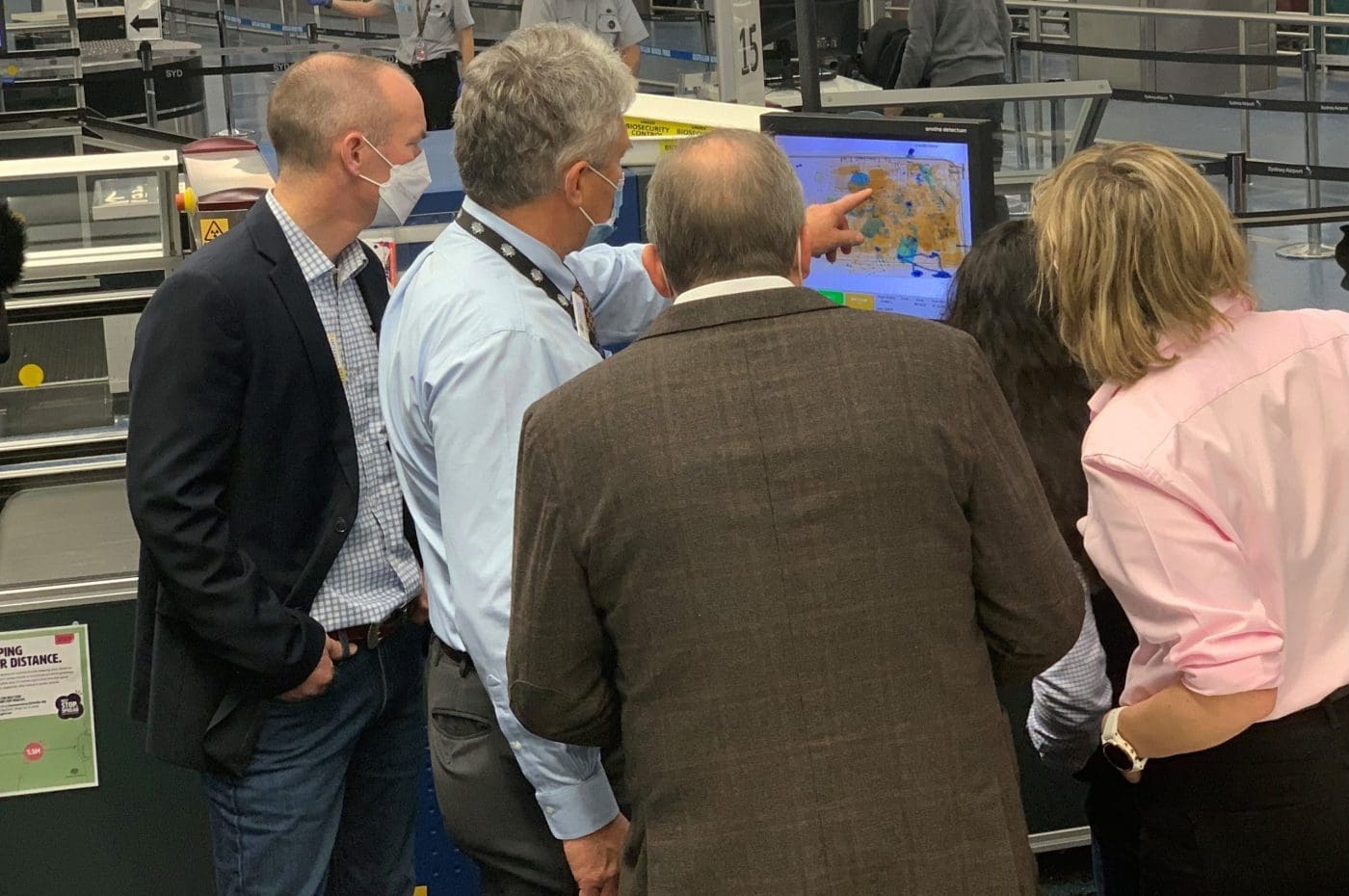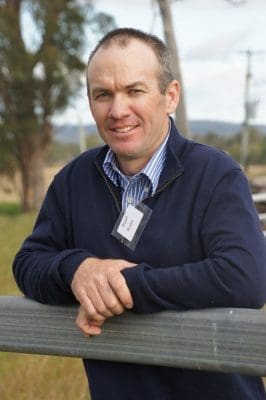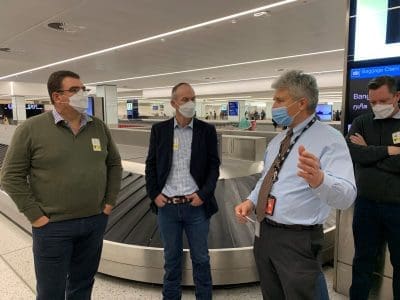New England cattle producer Stuart Austin says an opportunity to experience Sydney International Airport’s customs, immigration and biosecurity processes first hand has provided a level of comfort and demonstrated an absolute dedication of front line staff.

Stuart Austin (left) was part of a group of livestock producers and industry representatives who were given a chance to tour Sydney International Airport’s biosecurity measures.
ON Wednesday morning this week at 5am, alongside industry and government partners, I was incredibly privileged to have been taken on a rare ‘behind the scenes’ tour of Sydney International Airports customs, immigration and biosecurity areas – to see for myself how FMD is being kept out of Australia.
I’ve been somewhat vocal during the past few months about ensuring that everything is being done to protect our $80b livestock sector.

Stuart Austin, Willmot Cattle Co, Ebor, NSW
I have spent a considerable amount of time educating myself about the level of risk of an FMD incursion and trying to raise public awareness as to the seriousness of this risk. I have also been communicating the same message to government via a series of letters to MPs, including Federal Agriculture Minister Murray Watt.
As the GM of a beef cattle operation worth almost $100 million, it is my job to be as informed as I can be and share that knowledge with fellow red meat producers.
After spending over five hours with senior Department of Agriculture staff at the airport looking at every touchpoint and intervention, I came away with the overriding feeling that our frontline biosecurity team are doing absolutely everything they can to keep FMD out of Australia. And I don’t say that lightly!
They are throwing every resource they have at this challenge and have been adding new tactics almost daily during the past few weeks. A flowchart we were shown at the completion of the tour demonstrated how rapidly these interventions have evolved, to where there are now upwards of 20 different interventions in place.
During the pre-travel process of booking a trip there are multiple places whereby you are being informed about FMD, through government websites, Australian Border Force, Department of Trade and Agriculture paid and targeted social media campaigns, and travel agents. There are multiple visual and vocal reminders about FMD, from handouts, banners, and announcements pre-departure and again upon re-entry back into Australia. The foot mats are in place and are unavoidable.
Geofencing is another important tool. You know those messages you get from Telstra reminding you to turn on international roaming when your phone is in an international airport? The same process is used to remind you about FMD in Australian airports, and when you’re in an Indonesian airport returning to Australia. This is the very best of big brother at work!
 Through the customs and immigration process, travellers are now asked an additional question by biosecurity officers or Australian Border Force officers ‘have you been in Indonesia in the last 7 days?’. This is in addition to the questions on the Incoming Passenger Card (IPC). They are then asked further questions again in the baggage hall by roving Biosecurity Officers, and then again during the exit process. How passengers are directed from this point is at the discretion of the Biosecurity Officers, irrespective of what has been written on the IPC.
Through the customs and immigration process, travellers are now asked an additional question by biosecurity officers or Australian Border Force officers ‘have you been in Indonesia in the last 7 days?’. This is in addition to the questions on the Incoming Passenger Card (IPC). They are then asked further questions again in the baggage hall by roving Biosecurity Officers, and then again during the exit process. How passengers are directed from this point is at the discretion of the Biosecurity Officers, irrespective of what has been written on the IPC.
What is important to note, is that the IPC is a statutory declaration. Additionally, Biosecurity Officers are highly skilled experts at what they do. They know a higher risk passenger, that may be for example carrying contraband, from those who present a lower risk.
And while I was highly encouraged by what I saw, the system can never be 100% perfect.
There are 20,000 passengers a day presently arriving into Sydney International alone – pre-Covid levels had this number at 36,000 per day on average, with one instance shown to us where 5,300 passengers landed in Sydney within 37 minutes!
It is therefore the experience and intuition of our Biosecurity Officers that are ensuring the vast majority of higher risk passengers are being screened, via x-ray and luggage inspections or by the sniffer dogs, therefore greatly reducing the risk of someone being steered into the direct exit line who may be carrying something they shouldn’t.
Again, big brother is at work and watching, and there is a significant amount of artificial intelligence and algorithms being used to determine level of risk from each passenger.
What more can be done?
There is always more than can be done, and from my visit yesterday I have some suggestions:
- At the direct exit line, could there be a sniffer dog at work beside the officer inspecting the IPC and making the determination as to which way that passenger is directed? This was discussed and taken on board by Department staff.
- We were informed that more advanced x-ray technology will be trialled soon, with the ability to detect organic matter more proficiently.
- There will be sniffer dogs working the baggage carousels within days, I’m told. The inevitable ‘risk assessment’ is close to being signed off on this, bearing in mind that these dogs are worth about $100,000 each! Being run over by a luggage trolley, heavy suitcase, or passenger not watching where they are going is a very real and high risk to the dogs.
- Could additional profiling be undertaken around the destination postcode of a person? Such that those heading to a regional or peri-urban postcode be automatically directed for luggage inspections or screening by the sniffer dogs.
I can say with confidence that there is a high degree of passenger willingness to comply with Australia’s biosecurity protocols. They are the most stringent in the world and they are taken very seriously by the general public.
I acknowledge that this was just one airport of multiple ports of entry around Australia, however the Department of Agriculture staff we met with were incredibly knowledgeable, open and honest. They are highly trained and very experienced, and they are throwing everything they can at this issue to ensure our biosecurity integrity and FMD free status is not compromised, and they deserve recognition for these efforts.
Finally, I would like to extend my gratitude to Meat & Livestock Australia, who invited me to join the airport tour, and credit must go to them for planning and executing so professionally.
